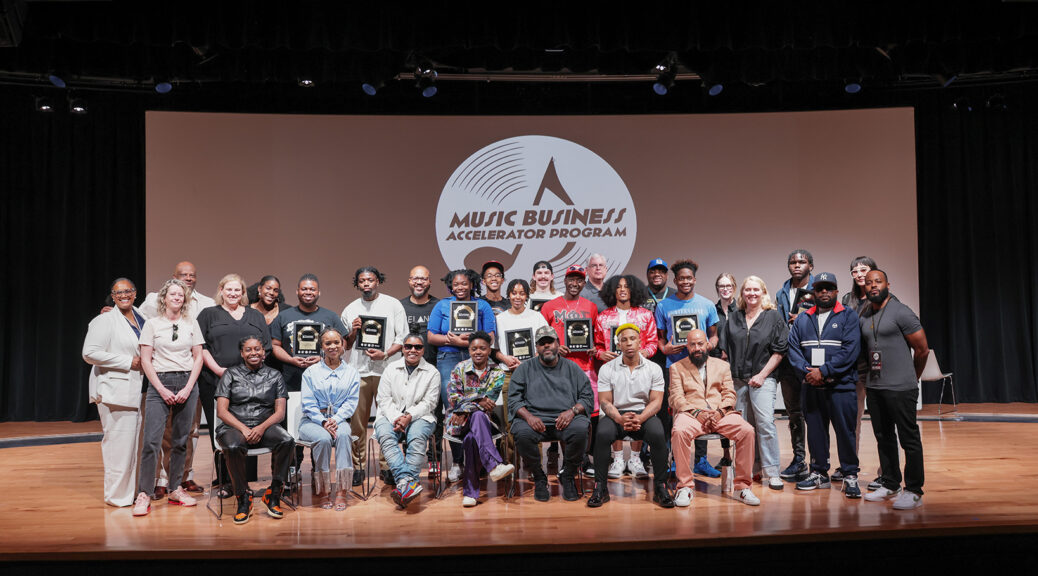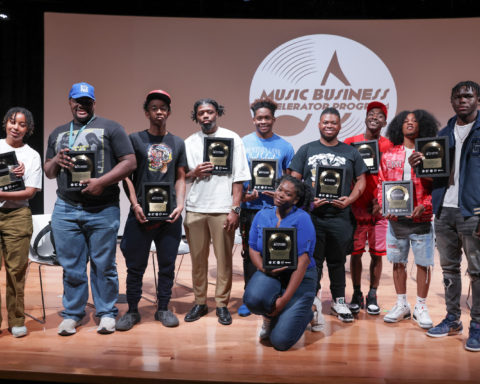By Alexis Clark
Imagine a classroom where aspiring music creatives gather to discuss business strategies and receive firsthand experiences from top music industry insiders. This is the reality for students enrolled in Tennessee State University’s Music Business Accelerator Program (MBAP). Going beyond just an academic experience, the MBAP is paving the way for the next generation of young Black music creatives, while combating economic disparities within the music industry.
The university partnered with the Black Music Action Coalition (BMAC) to address underserved markets and provide firsthand resources and representation for Black commercial music students like no other. The MBAP’s second cohort left TSU students with a glimpse of their future careers after being exposed to insight from powerhouse executives, talent agencies, and top music artists.
TSU student Joshua “LilCEOJosh” Akhidenor said he never imagined shaking hands with his favorite Grammy award-winning music producer of all time, Rodney Jerkins. “This class was perfect for my career as a music producer and artist because it deeply taught me the music industry and the importance of knowing the business,” Akhidenor, of Memphis, said.
While TSU student, artist Emmanuel “Mille Manny” Strickland had the opportunity of an opening performance for rapper Waka Flocka Flame at Brooklyn Bowl after winning an Music Business Accelerator class competition. The rapper told the students during class at East Iris Studios, that these opportunities are preparing them to step into the music industry. “Having this conversation is a peek into your potential future,” Waka Flocka Flame said.
TSU music business students spent the last four weeks with representatives from Tri-Star Entertainment Agency, Live Nation Entertainment, Rolling Loud, Wasserman Media Group, Def Jam Recordings, Amazon Music, Warner Bros., and more. TSU students had the opportunity to discuss marketing, record label deals, artists and repertoire, and financial literacy with music industry insiders.
Willie “Prophet” Stiggers, the co-founder and chair of the Black Music Action Coalition, said the TSU program has led students to employment and paid internships, and will continue to do so going forward. “We are really creating a pipeline for success in a tangible way,” Stiggers said. “Our goal is to create access and an opportunity for talent to be nurtured here (Nashville), stay, and grow a career here.”
Stiggers expressed how deliberate Nashville and Music Row have been in “isolating the Black creative community and the Black audience from this experience,” he said. “So, we were looking for ways to break down those barriers.”
D’rell Player, a TSU senior who is a commercial music major, said being in the studio with Waka Flocka Flame, felt like home. “This class has managed to put me in a work environment that I want to be in,” Player said. “It’s given me more lessons, experience, and exposure in my chosen career field than I ever could have imagined.”
TSU senior Link Fisher III couldn’t agree more. Fisher, of Memphis, noted that discussing financial literacy with representatives from Live Nation was the highlight of the course. “This opportunity has made everything I have learned applicable to real life,” Fisher said. “That was the first time we sat down with a spreadsheet to see where the dollars go.”
The last day of the class concluded at the National Museum of African American Music with an All-star panel that consisted of Stiggers, BMG music company executive Tim Reid, Producer and songwriter Rodney Jerkins, Rapper Yellopain, actresses and artists Serayah and Bre-Z, SiriusXM’s media personality Swaggysie, and artist Daisha McBride.
Actress and singer Serayah, widely known for her role on the musical drama TV series Empire, told the students to dream big and to keep going. “It’s important to push this program because it means so much,” Serayah said. “It can build us in unity, with our talent, we can really put the purpose together.”
The next generation of music creatives then received plaques from the Recording Industry Association of America (RIAA) to close out their Maymester course.
TSU alumnus Brian Sexton, the Community Outreach Chair for Nashville Music Equality, said that in order to make significant contributions to the industry’s economic landscape, Black creatives must have these resources, access, and educational opportunities. “We are heavily investing in our young creatives, and they are getting the support they need at every level,” Sexton said.
“Our model in Nashville is the only model that puts students in a very high networking experience, high-level knowledge-based environment,” he said. “The access that takes literally a career to get to, these students had that access within one month.”
Music is deeply rooted in African American culture and has played a significant role in shaping music history. By offering classes like TSU’s Music Business Accelerator Program at HBCUs, the impact can be multifaceted and everlasting for young Black music artists and creatives.





